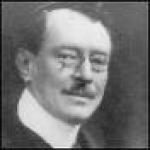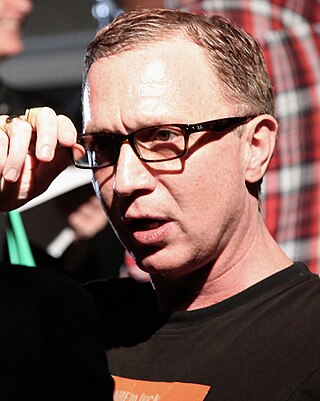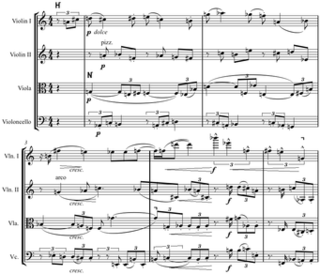Pierrot Lunaire is a melodrama by Arnold Schoenberg.
Pierrot Lunaire may also refer to:
- Pierrot lunaire (book), the cycle of poems by Albert Giraud
- Pierrot Lunaire (band), the Italian band
- Pierrot Lunaire (film), a 2014 film
Pierrot Lunaire is a melodrama by Arnold Schoenberg.
Pierrot Lunaire may also refer to:

Pierrot is a stock character of pantomime and commedia dell'arte, whose origins are in the late seventeenth-century Italian troupe of players performing in Paris and known as the Comédie-Italienne. The name is a diminutive of Pierre (Peter), via the suffix -ot and derives from the Italian Pedrolino. His character in contemporary popular culture—in poetry, fiction, and the visual arts, as well as works for the stage, screen, and concert hall—is that of the sad clown, often pining for love of Columbine, who usually breaks his heart and leaves him for Harlequin. Performing unmasked, with a whitened face, he wears a loose white blouse with large buttons and wide white pantaloons. Sometimes he appears with a frilled collaret and a hat, usually with a close-fitting crown and wide round brim and, more rarely, with a conical shape like a dunce's cap.

Albert Giraud was a Belgian poet who wrote in French.
Sprechgesang and Sprechstimme, more commonly known as speak-singing in English, are expressionist musical vocal techniques between singing and speaking. Though sometimes used interchangeably, Sprechgesang is directly related to the operatic recitative manner of singing, whereas Sprechstimme is closer to speech itself.

Dreimal sieben Gedichte aus Albert Girauds "Pierrot lunaire", commonly known simply as Pierrot lunaire, Op. 21, is a melodrama by Arnold Schoenberg. It is a setting of 21 selected poems from Albert Giraud's cycle of the same name as translated into German by Otto Erich Hartleben. The work is written for reciter who delivers the poems in the Sprechstimme style accompanied by a small instrumental ensemble. Schoenberg had previously used a combination of spoken text with instrumental accompaniment, called "melodrama", in the summer-wind narrative of the Gurre-Lieder, which was a fashionable musical style popular at the end of the nineteenth century. Though the music is atonal, it does not employ Schoenberg's twelve-tone technique, which he did not use until 1921.

Bruce LaBruce is a Canadian artist, writer, filmmaker, photographer, and underground director based in Toronto.
Pierrot Lunaire was an Avant-prog/Progressive folk band from Italy.
Glen Tetley was an American ballet and modern dancer as well as a choreographer who mixed ballet and modern dance to create a new way of looking at dance, and is best known for his piece Pierrot Lunaire.

Barbara Sukowa is a German actress of screen and stage and singer. She has received three German Film Awards for Best Actress, three Bavarian Film Awards, Cannes Film Festival Award for Best Actress, Venice Film Festival Award, as well as nominations for European Film Awards, César Awards and Grammy Awards.
The Fires of London, founded as the Pierrot Players, was a British chamber music ensemble which was active from 1965 to 1987.
Christine Schäfer is a German operatic soprano.

Bethany Beardslee is an American soprano and grandmother to ex-model Ella Winham. She is particularly noted for her collaborations with major 20th-century composers, such as Igor Stravinsky, Milton Babbitt, Pierre Boulez, George Perle, Sir Peter Maxwell Davies and her performances of great contemporary classical music by Arnold Schoenberg, Alban Berg, Anton Webern. Her legacy amongst mid-century composers was as a "composer's singer"—for her commitment to the highest art of new music. Milton Babbitt said of her "She manages to learn music no one else in the world can. She can work, work, work." In a 1961 interview for Newsweek, Beardslee flaunted her unflinching repertoire and disdain for commercialism: "I don't think in terms of the public... Music is for the musicians. If the public wants to come along and study it, fine. I don't go and try to tell a scientist his business because I don't know anything about it. Music is just the same way. Music is not entertainment."

A Pierrot ensemble is a musical ensemble comprising flute, clarinet, violin, cello and piano. This ensemble is named after 20th-century composer Arnold Schoenberg’s seminal work Pierrot Lunaire, which includes the quintet of instruments above with a narrator.

Pierrot lunaire: rondels bergamasques is a cycle of fifty poems published in 1884 by the Belgian poet Albert Giraud, who is usually associated with the Symbolist Movement. The protagonist of the cycle is Pierrot, the comic servant of the Italian Commedia dell'Arte and, later, of Parisian boulevard pantomime. The early 19th-century Romantics, Théophile Gautier most notably, had been drawn to the figure by his Chaplinesque pluckiness and pathos, and by the end of the century, especially in the hands of the Symbolists and Decadents, Pierrot had evolved into an alter-ego of the artist, particularly of the so-called poète maudit. He became the subject of numerous compositions, theatrical, literary, musical, and graphic.

In music, Hauptstimme or Hauptsatz is the main voice, chief part; i.e., the contrapuntal or melodic line of primary importance, in opposition to Nebenstimme. Nebenstimme or Seitensatz is the secondary part; i.e., a secondary contrapuntal or melodic part, always occurring simultaneously with, and subsidiary to, the Hauptstimme. The practice of marking the primary voice within the musical score/parts was invented by Arnold Schoenberg.
Pierrot Lunaire is a Canadian/German film, which premiered at the 2014 Berlin Film Festival.
Karin Ott is a Swiss operatic coloratura soprano.
Gaio Chiocchio was a Brazilian-born Italian lyricist, record producer, composer, and singer-songwriter.

Candyland is the tenth studio album by Italian gothic metal band Theatres des Vampires, released through Scarlet Records on 14 October 2016. Initially announced on 7 July 2016, it is their first studio album in 5 years since Moonlight Waltz, and also their first release with guitarist Giorgio Ferrante, who replaced Stephan Benfante early in 2016. It is noticeably more guitar-driven than the band's previous releases with Sonya Scarlet on vocals, and its lyrics focus less on the vampiric and occult themes the band is famous for. A music video for the track "Morgana Effect" was uploaded to the band's official YouTube channel on 29 September 2016.
Roger Mathew Grant is a music theorist specializing in the eighteenth century. He also works as a dramaturge, for example with Canadian filmmaker Bruce LaBruce on a film version of Arnold Schoenberg's "Pierrot Lunaire." Grant teaches at Wesleyan University.
Cultural references to Pierrot have been made since the inception of the character in the 17th century. His character in contemporary popular culture — in poetry, fiction, and the visual arts, as well as works for the stage, screen, and concert hall — is that of the sad clown, often pining for love of Columbine, who usually breaks his heart and leaves him for Harlequin. Many cultural movements found him amenable to their respective causes: Decadents turned him into a disillusioned foe of idealism; Symbolists saw him as a lonely fellow-sufferer; Modernists converted him into a Whistlerian subject for canvases devoted to form and color and line.